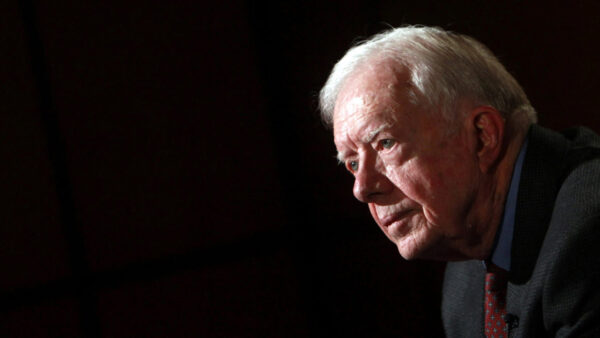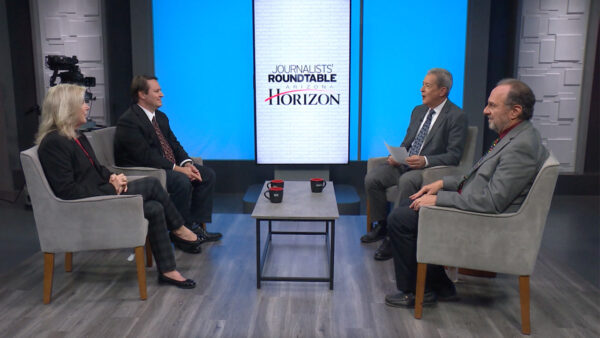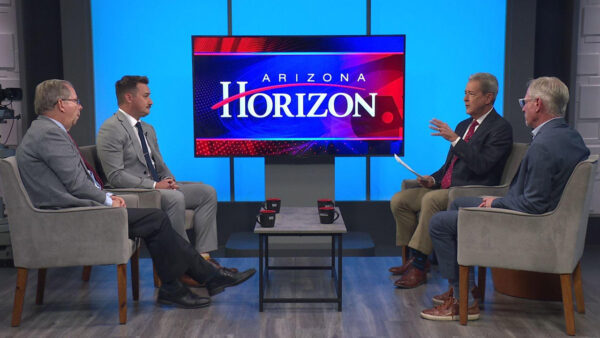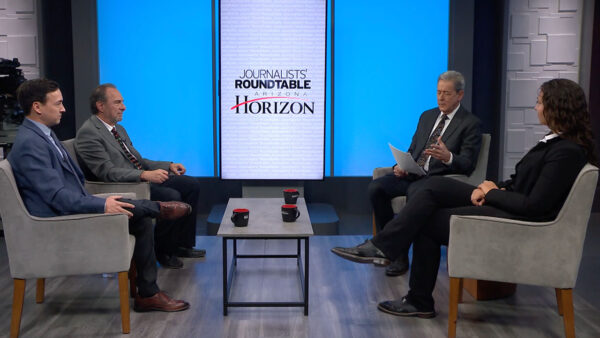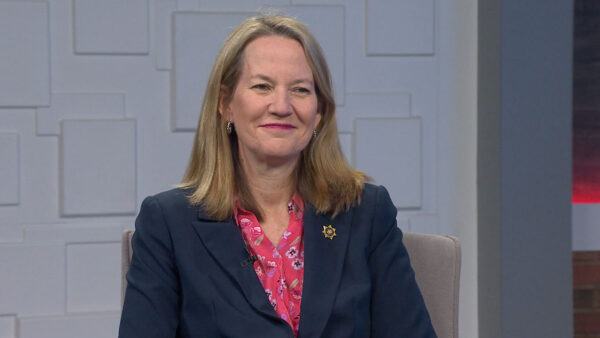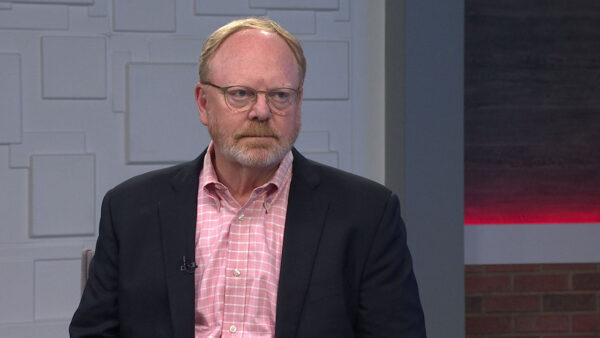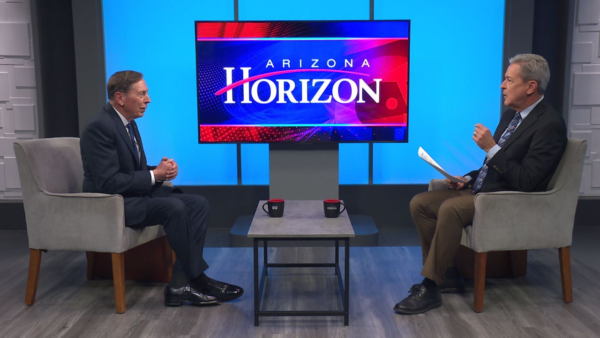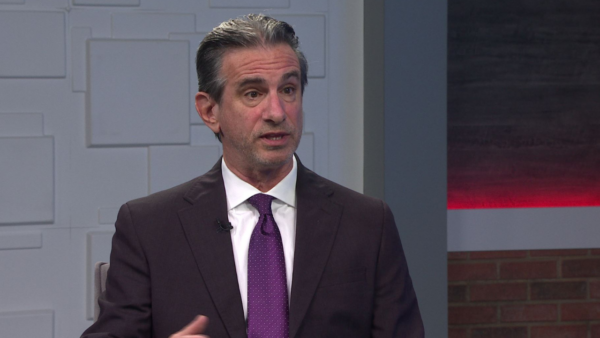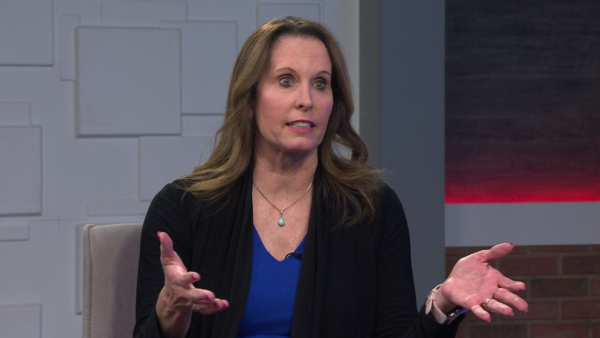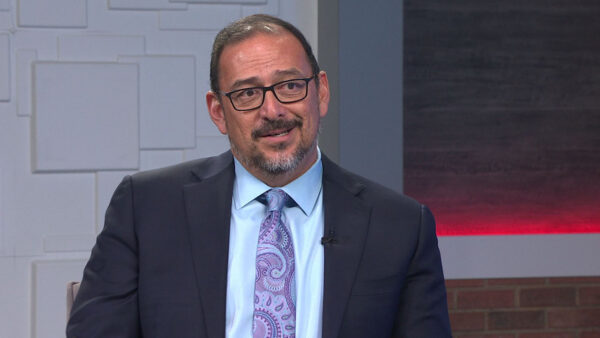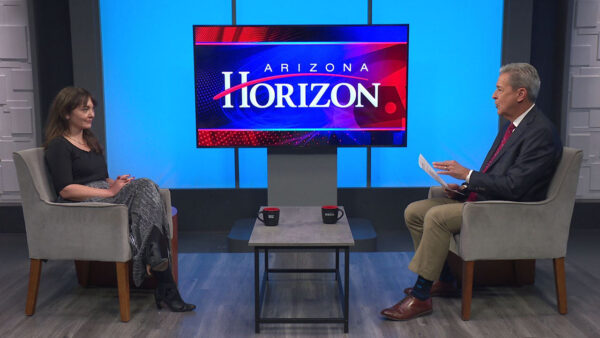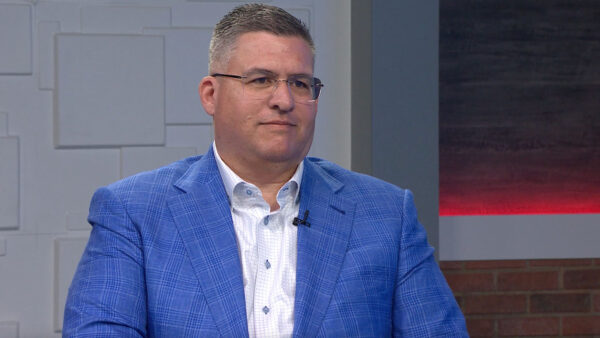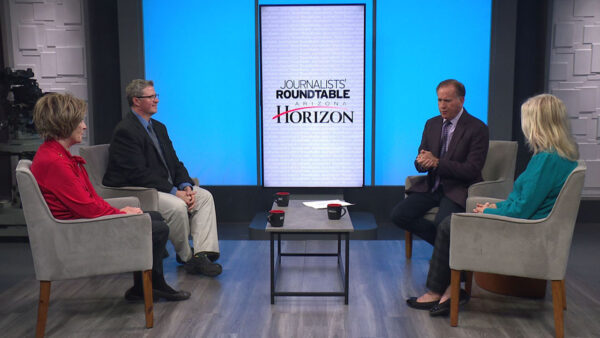In honor of statehood week, Horizon looks at Arizona’s first governor – George Hunt. He was considered a man of the people and is perhaps one of the state’s most colorful and effective leaders.
>> Michael Grant:
Tonight on "HORIZON", how did one of the largest cities in America lose the ability to produce clean water? The city of Phoenix releases results of an investigation into the events that triggered a boil water advisory. That episode is just the latest in a number of problems with the city's water department. Plus, in honor of statehood week, we introduce you to Arizona's first governor. George Hunt was considered a man of the people and is perhaps one of the state's most colorful and effective leaders.
>> Announcer:
"HORIZON is made possible by the friends of Channel 8, members who provide financial support to this Arizona PBS station. Thank you.
>> Michael Grant:
Good evening, I'm Michael Grant. Welcome to "HORIZON." Three weeks ago the city of Phoenix issued a "boil water" advisory to residents. A preliminary report released today found that while the water did have visible particles in it, the water was safe to drink. The inquiry into the boil water advisory given by the City of Phoenix Water Department found that other cities were able to treat and use the same water that shut down a Phoenix water treatment plant. In a presentation to the Phoenix City Council Subcommittee, City Auditor Randy Spenla also noted that water department employees either called the wrong numbers of county health officials or called numbers that went unanswered in the middle of the night.
>> Randy Spenla:
And I think what we learned is the time of night really complicated our response. We weren't prepared to communicate to make a serious decision in the middle of the night. And we are going to have to be, we're going have to put processes and build things in to take the time of day out of the equation because the next disaster, the next situation it may not show up from 9 to 5 and we simply weren't ready to communicate that evening.
>> Michael Grant:
This is video of the Val Vista water plant that was shut down because of turbid water. The city of Phoenix has a total of five plants, but two were already shut down for routine cleaning and maintenance of canals that supply the plant's water. The city auditor noted the closure of those two plants contributed to the city's limited water supply.
>> Randy Spenla:
One possibility is that instead of taking both plants off-line at the same time, it is possible to keep one plant on-line while the other is in a dry area of the canal. And that's at least an alternative or something that needs further consideration by the experts when they get involved.
>> Michael Grant:
Joining me now is Phil Gordon. He is the mayor of the City of Phoenix and City Councilman, Claude Mattox. Councilman Mattox chairs the city's natural resources subcommittee. Gentlemen, welcome back.
>> Claude Mattox:
Good evening, Michael.
>> Phil Gordon:
Good evening.
>> Michael Grant:
Mayor this was put together, this report was obviously put together in just a couple of weeks. How confident or secure are you in at least the tentative conclusions being reached here?
>> Phil Gordon:
I'm very confident. We committed that we would have an open, transparent process. The auditors went and spent over 600 hours interviewing nearly 70 individuals, outsiders and people involved in the whole incident including myself and my colleagues, did a complete timeline, reviewed all the documents and did a top to bottom research and review and audit. Based on a lot of questions that our public wanted answered and that we wanted answered. First and foremost was the water safe? Answer was verified yes. Could the incident have been prevented? The answer is yes. Number three was whether the break down in communication internal and external to the public and to our system could have been prevented and could have been better. And the answer to that is yes.
>> Michael Grant:
Councilman Mattox, it seems to me that the fact that the water was safe is a good news and bad news story. The good news is clearly the water is safe. The bad news is was the right decision made to issue the boil water advisory if the water was safe?
>> Claude Mattox:
We can't second guess that decision. We didn't know at the time whether the water was in fact safe or not. We know now because there were tests being done on the water at that time and subsequent tests that were being done that gave us the information that we know now. The circumstances that brought us to that point was that the plant had been dumped and they didn't know the quality of the water coming in. So when they released water into the system and that was to maintain the pressure so that we didn't lose the potential to fight fires and to keep the pressure in the system, which would not have allowed air to get in the system which could have complicated the matters even worse. At this time we now know that the water was safe. But we were being cautious so we would prevent any public safety concerns.
>> Michael Grant:
Were there any protocols or procedures in place to deal with that kind of situation? Turbidity itself, the water doesn't look very good, it's basically dirt in the water. And there is a federal standard on it. On the other hand, it only indicates that there may be a problem, it may provide a place for bacteria to grow. What's your opinion on it? Was the trigger pulled prematurely or should not have been pulled at all?
>> Phil Gordon:
First of all, we want to make sure that our employees, whether it's in the water department, police department, whatever, do what they feel is appropriate under the circumstances at the time.
>> Michael Grant:
What advice was the county giving on that?
>> Phil Gordon:
One of the things the audit, this is by the way the preliminary audit, one of the things that the audit found was that unfortunately, communication didn't exist between our city and the county because we weren't able to get through. Probably as a result of the city and not the county. That is being researched further. To make sure one of the protocols that will be established is a 24 hour communication process. The other thing that's very important, you asked whether there are protocols, that notebook my colleague has brought, those are the protocols. But what the audit also determined was that you can have the best protocols, the best plans, but if they are not researched, if they're not trained, if they're not practiced, nobody knows how to use it. And that was determined that we need to do that. A lot of things were learned in this audit that are procedures to help prevent this from happening in the future, that have already been implemented, communication procedures both internally and externally so that we keep the public updated in a more accurate and a more timely basis. Internally, that we're informed, and a crisis management team is put together quicker.
>> Michael Grant: Obviously the heavy rain that I think led to a lot of this problem that occurred in late December, early January, about three weeks before the problem came up. A lot of people ask the question, okay, we understand it was 1:30 in the morning before the problem was perceived and that poses communication difficulties internally and externally with the public. But you're sitting there scratching your head saying why was it 1:30 in the morning three weeks after the situation that occurred that would lead to the excess turbidity in the plant? Why wasn't it factored in?
>> Claude Mattox:
Well, we had known there was issues and the plant was dealing with these issues for several days. And what we have found is that the design of the plant which was, it was built back in 1970, the second plant was build in the '80s, that the plant was built prior to some regulatory changes that changed the standard for turbidity and also it changed the standards required for discharging water into the canal. Historically, we had been able to discharge water into the canal, we couldn't do that anymore which caused water to be recycled through the plant. And what was happening was that dirty water was being recycled and we were adding more dirty water and it was being recycled, and it had gotten to the point where it clogged the system up. We were back-flushing the system and the system overflowed, it flooded one of the plants and one of the plants went down. All of these things we have now learned through the process.
>> Michael Grant:
I understood that a step that could have been taken would have included dumping of the plant into the canal.
>> Claude Mattox:
That's what ultimately got the water quality back to the level that it needed to be. We dumped the plant.
>> Michael Grant:
Was that a federal violation?
>> Claude Mattox:
We will find that out. There is a procedure that you have to go through in order to get permission to do that. We will now have to go through the process after the fact. And, ADEQ, the Department of Environmental Quality will review that and tell us if we have had a violation of the discharge. And we'll have to deal with that as we go through this process.
>> Michael Grant:
Other cities were facing similar problems, the report points out but still were able to successfully treat their water. I think one of the issues was the City of Phoenix ran out of lime, which would have been one of the things they could treat with. And again, if you know there's a potential of a problem several days earlier, why did we run out of lime?
>> Phil Gordon:
Again, this audit was to find out what went wrong and make sure it doesn't happen again. My colleague and I are committed that it doesn't happen again, and we have learned a lot. One of the issues was, could we have been treating it differently? I think what the audit at least preliminarily determined is that there were a number of circumstances including the early warning signs that had they been followed could have prevented the issue of 1:30 in the morning running out of alternatives short of doing the running out of water. Lime could have been one possibility, the other one again is dumping the water earlier, which under certain circumstances is allowed. We learned that some of the employees were recommending that earlier.
>> Michael Grant:
Right.
>> Phil Gordon:
It really is, and I think what my colleague and I are committed to is from our perspective, we're not going to second guess that decision at 1:30, whether that warning should have been issued or not, we want to make sure to err on any side of caution as opposed to being sorry later.
>> Michael Grant
: If these things are going to be further investigated in the balance, why did you run out of the lime several days earlier, why was it perceived at 1:30 in the morning instead of earlier, etc?
>> Phil Gordon:
Michael, absolutely. Including the recommendation of the auditors that we've already agreed to, let's get an independent outside expert to look at the design of the plant. Also to look at whether we can use more wells, that hasn't worked with the city that isn't involved in this type of construction with the city to analyze the auditor's findings. We're going to make sure that it doesn't happen again.
>> Claude Mattox:
Michael, to answer your question, also, Tempe, Chandler and Mesa were warned about the water quality issue that we were having, and they were able to basically divorce themselves from our system and go to well water or ground water pumping which supplemented their supply. When they did go back on our system, they were able to keep their production low enough to where they could treat the water and not have the same problems that we had, again being supplemented by ground water. We didn't have that ability.
>> Michael Grant:
Does this report point a very strong finger at the Water Services Director and fix much of the blame there?
>> Claude Mattox:
What it does is it identifies problems that were within the system. I'm not going to blame any one person. I think overall, the Water Services Department needs to look at their communications process. They need to look at their emergency procedures. They need to practice what's in this book when they have a problem and then we as a city need to look at our overall process in communications and emergency processes to make sure that we don't have a repeat of this problem with other departments in the city of Phoenix.
>> Michael Grant:
Has he been relieved of his duties?
>> Phil Gordon:
He has been relieved of those duties, temporarily assigned on special assignment in another area, not related to water.
>> Michael Grant:
An Arizona Republic investigation of the city records shows the City of Phoenix Water Department received hundreds of state and federal violations costing the city more than $1.6 million since 1988. The Republic found that top water officials gave inconsistent responses to state and federal regulators, down played violations by claiming there was no danger to public health over non-compliance and gave incorrect and false information to city managers. The Arizona Republic also reported that Phoenix Water Services Director Mike Gritzuk was suspended for five days over the way he handled an earlier audit. Councilman Mattox, I seem to recall talking to you about the environmental group report about a year and a half ago. Were you aware of the problems that the Republic discussed?
>> Claude Mattox:
I was not aware of all of the problems at that time. And when we had the conversation, if I remember, we had the director of ADEQ here with us, as well, having the same conversation on it and we were talking about how the report from the natural resources defense -- I can't -- defense committee or something to that effect was basically a report about a report. They were talking about how we weren't -
>> Michael Grant:
Reporting issues, different data sets. Those kind of things. This seems to indicate that the problems were much more fundamental.
>> Claude Mattox:
Well, I'm not going to -- Now that I know what I know at this point, that this was symptomatic of some of the issues that we were dealing with, I was not aware of some of the infractions prior to myself coming on the Council which was five years ago. I was aware of some of the things identified in the republic after the fact, which was the lab issue that Mr. Gritzuk got suspended for five days on. We now know there was a history of things happening in the department that ultimately, I would say, in this particular case the events that occurred on January 24th and 25th brought Frank Fairbanks the city manager to the point where he felt it was necessary to reassign Mr. Gritzuk.
>> Michael Grant:
Was the city manager actively kept out of this loop? A million six should have given some indications to somebody we may have structural problems here.
>> Phil Gordon:
You know, Michael, this report, what it does is create a time line and it shows very clearly that not only the city manager and deputy city manager, senior elected officials were not only unaware of the protocols that should have been followed that the plant had problems as early as Saturday, significant problems, but that until after the process we didn't learn about some of the problems or weren't notified. The city manager Frank Fairbanks, under the charter is responsible for the personnel matters, we're responsible to make sure that it gets fixed. The city manager determined that in order to have a complete and open audit, seamless, that he needed to reassign and relieve the director of his duties. What happens at this point will be up to the city manage on that and any other personnel. I think you asked a question that I would like to address based on my review of the report. There was clearly a culture within the water department that is unhealthy for the safety of our community and that was --
>> Michael Grant:
How so?
>> Phil Gordon:
To keep information within the actual operation and not follow the protocols that were established by the city manager and deputy city manager. Again, not that at 1:30 in the morning somebody should have issued a boil advisory alert or not, but whether city management should have been brought in earlier, certainly whether the elected officials should have been brought in earlier. And also, after that issue was given to the public at 1:30 in the morning, then to contact both the city management team and the elected officials so that we could determine the actions at that point.
>> Michael Grant:
Councilman Mattox, the problem here is that if these problems were systemic, going on for a long time, apparently they date back to at least 1988, okay, you have a problem in the Water Services Department, but doesn't it speak to the level of supervision and oversight that the city manager's office was giving to the water services department? Which I would think would be one of the city's key departments.
>> Claude Mattox:
Absolutely. It's probably, along with our solid waste people expect when they turn the tap on, the water is there, and so to answer your question, Frank Fairbanks is responsible for personnel. What I understand is that when we ran into issues, Frank took corrective actions on those issues. To my knowledge, it was a progression of steps that ultimately ended up with Mr. Gritzuk being suspended for five days. And I can't tell you what specific investigations or reviews were done on Mr. Gritzuk because our charter prohibits City Council getting involved in personnel issues so we have to respect Frank Fairbanks' decision on that.
>> Michael Grant:
But you do have ability to hire and fire city managers?
>> Phil Gordon:
Mike, let me be clear. First off, we have the top city manager in this country, I back the city manager and I know all my colleagues do. The city manager thought he had taken the appropriate action and that was based on all the information he got, you can only make decisions based on what you have, he had corrected that. We learned through this incident that was not the case. When he learned about it, he immediately took the action of getting him out of there.
>> Michael Grant:
Phoenix mayor Phil Gordon, we appreciate your being here, talking to us about it. Councilman, Claude Mattox, our thanks to you as well.
>> Michael Grant:
In recognition of statehood week, "Horizon" begins a special series called "Arizona Stories" tonight. These stories are about significant people, places and events in our state's history. Tonight we start with someone who is considered one of Arizona's most colorful politicians. George Hunt was looking to make a name for himself when he arrived in Globe as a young man in 1881. By the time he died in Phoenix more than 50 years later, Hunt established himself as one of the state's most important citizens ever elected to office.
>> Paul Atkinson:
Arizona's first governor may be the state's most memorable if not the most recognizable.
>> Melanie Sturgeon:
He was bellicose, he had the big mustache, big physique, wears the white suits, someone who really knows how to portray himself politically to get the most mileage out of himself.
>> Paul Atkinson:
George Wylie Paul Hunt, born in 1859 in Huntsville, Missouri, named after his grandfather. Still in his teens, he left home seeking work and adventure in Colorado and New Mexico. Hunt made his way to Arizona a few years later in 1881.
>> Phil McBride:
When he arrived in Globe, he came in like a prospector, wearing overalls, driving a bull, got a job as a waiter.
>> Paul Atkinson:
Hunt later went to work for a local mercantile and bank called the Old Dominion Commercial Company. Within 10 years he was its president. It was in Globe that Hunt found his calling in politics.
>> Melanie Sturgeon:
He was a very friendly person, a very outgoing person. The perfect politician, I think, so he decided to run for county office. And that's how he launched his political career.
>> Paul Atkinson:
Hunt lost but in 1892 was elected as a Democrat to the territorial House of Representatives. He served seven terms in both the House and Council, what is now the Senate. Hunt was elected to preside over the Arizona constitutional convention in 1910. At Hunt's request, the constitution did not give women the right to vote.
>> Melanie Sturgeon:
He felt there was so much controversy in the state at that time over women's suffrage, that if he championed that in the constitutional convention, it would sidetrack a number of other issues that were not more important, but that could have gotten the constitution down, and he wanted to make sure that we became a state.
>> Paul Atkinson:
Women got the right to vote the year Arizona became a state and George Wylie Paul Hunt its first governor.
>> Phil McBride:
He lived in the Ford Hotel, when Arizona became a state, and he walked from downtown Phoenix to the Capitol for the inauguration. He immediately then authorized the purchase of a car. That walk was the last time that Hunt walked. The rest of the time he used a car and a chauffeur.
>> Paul Atkinson:
Hunt used the car to travel the state, always bringing a camera, pen and paper. He took thousands of pictures and wrote more personal letters than any other governor.
>>Phil McBride:
He drove constantly. He would pick up hitchhikers. It was not unusual to invite them to lunch. He identified with --
>> Paul Atkinson:
The poor treatment of prison inmates became a priority with Hunt.
>> Phil McBride:
He was interested in prison reform right down to how they lived. When he would go down, he would go down frequently. In the night, he slept in a cell. He would eat in the prison dining hall. He started the honor system there at the prison.
>> Paul Atkinson:
Hunt used prison work crews to build some of Arizona's first highways. Executions were even outlawed for a brief period thanks to Hunt's sheer will and determination. His penchant for the common man helped him get elected governor a total of seven times. But his demanding style wore thin on some.
>> Phil McBride:
There were those who felt he was becoming virtually a dictator. As he ran the later elections, Hunt the 5th, Hunt the 6th, Hunt the 7th.
>> Paul Atkinson:
Hunt also served as the Ambassador to Siam, what is now Thailand. While there, he continued his prolific writing, a passion that proved its worth twenty years earlier. His letters to the daughter of a Payson rancher helped rekindle a relationship that had broken off because of the woman's duty to her family's ranch.
>> Female voice:
My dear George, can't you imagine how my heart is torn by this conflict between my love and duty? My heart is entirely yours. I must of my own accord send you from me for there is no hope that I can see, nothing but hard, stern duty. Now and always, Duet.
>> Male voice:
Miss Duet Ellison, I often wonder if this is to continue always like this. Is there no sunshine and happiness in the future in store for me? No whisper of hope, nothing but dreary, dreary blank for the coming years. Like the hourglass, the sands of our life are drifting away. And in a few short years, the bell will be tolled and we pass away and forever. Yours forever, George WP Hunt.
>> Paul Atkinson:
The legacy of George and Duet Hunt can still be seen today. When Hunt died in 1934, he was laid to rest next to Duet in a white pyramid at Phoenix Papago Park.
>> Melanie Sturgeon
: It's sort of a capstone to his life, that there he is as large as life in his white, out in the middle of Papago Park. You can't miss it, just like you can't miss him. He really had an indelible effect on Arizona's early years of statehood. He was a very, very, I think probably the most important figure as far as Arizona goes and what ended up happening in our government.
>> Michael Grant:
Tomorrow night, our Arizona story will profile La Casa Vieja in Tempe. We'll see how the childhood home of Carl Hayden has evolved over the years into a landmark with a rich history.
>> Merry Lucero:
In honor of Black History Month, "HORIZON" profiles an award winning black filmmaker and we discuss African-American cinema. Plus, we tell you an Arizona story about an historic adobe hacienda built at the edge of the Salt River. La Casa Vieja was a ferry-house, residence and business and is now a well-known landmark. Those stories Wednesday on "HORIZON."
>> Michael Grant:
Thanks very much for joining us on a Tuesday. I'm Michael Grant. Have a great one. Good night.
Phil Gordon:Mayor of the City of Phoenix;Claude Mattox:Phoenix City Councilman and Chair, Phoenix Natural Resources subcommittee;

